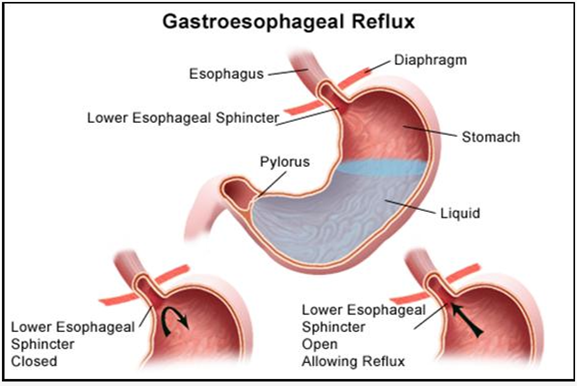The nurse is explaining the alteration in normal function to a patient recently diagnosed with gastroesophageal reflux disease (GERD). Which etiology contributing to GERD does the nurse include in the teaching session?
Incompetent lower esophageal sphincter.
Decreased pressure within the stomach.
Transient constriction of the lower esophageal sphincter
Prolonged constriction of the upper esophageal sphincter.
The Correct Answer is A
The lower esophageal sphincter (LES) is a muscular ring located between the esophagus and stomach. Its function is to prevent the backflow of stomach acid and contents into the esophagus. In GERD, the LES becomes weak or relaxed, allowing stomach acid to flow back up into the esophagus, leading to symptoms such as heartburn, regurgitation, and chest pain.

Nursing Test Bank
Naxlex Comprehensive Predictor Exams
Related Questions
Correct Answer is C
Explanation
Taking an extra dose of Aspirin prior to surgery can significantly increase the risk of bleeding during and after the surgical procedure. Aspirin is a non-steroidal anti-inflammatory drug (NSAID) that can interfere with the normal blood clotting process. Surgical procedures often require meticulous control of bleeding, and the presence of Aspirin in the patient's system can pose a significant risk.
It is essential for patients to follow preoperative instructions provided by the healthcare team, including avoiding certain medications or substances that can increase the risk of complications during surgery. Taking an extra dose of Aspirin, especially without consulting the healthcare provider, can jeopardize the safety of the surgical procedure and may require rescheduling to ensure the patient's well-being.
Correct Answer is A
Explanation
Recombinant human erythropoietin is a medication commonly used in the treatment of anemia associated with chronic renal failure. It stimulates the production of red blood cells in the bone marrow, helping to improve anemia.
The other statements mentioned do not accurately reflect the expected outcomes or effects of recombinant human erythropoietin:
Chronic renal failure leads to impaired kidney function, and while recombinant human erythropoietin can help address anemia, it does not directly improve creatinine (Cr) and blood urea nitrogen (BUN) levels, which are markers of kidney function.
Furosemide is a diuretic commonly used in the management of fluid retention in renal failure. Recombinant human erythropoietin does not replace or eliminate the need for diuretic therapy.
Chronic renal failure typically involves decreased kidney function and impaired urine production. Recombinant human erythropoietin does not directly affect urine output.
Whether you are a student looking to ace your exams or a practicing nurse seeking to enhance your expertise , our nursing education contents will empower you with the confidence and competence to make a difference in the lives of patients and become a respected leader in the healthcare field.
Visit Naxlex, invest in your future and unlock endless possibilities with our unparalleled nursing education contents today
Report Wrong Answer on the Current Question
Do you disagree with the answer? If yes, what is your expected answer? Explain.
Kindly be descriptive with the issue you are facing.
